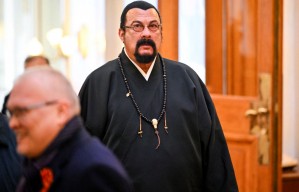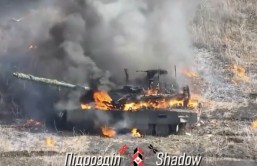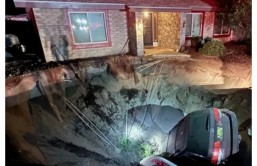Russian opposition leader Alexei Navalny's corpse was sent to his mother on Saturday, February 24, in the Arctic city of Salekhard, according to his spokesperson. The circumstances surrounding the transfer of the body remain unknown. Navalny passed away suddenly in jail nine days ago.
Navalny's family and supporters have accused Russian President Vladimir Putin of ordering his assassination, a charge that the Kremlin has denied. In Navalny's death certificate, he passed away from natural causes, according to his team's statement on X last week.
In 2020, Navalny managed to withstand an attempt at poisoning as well as years of brutal jail conditions, including extended periods of solitary confinement.
Flowers are seen placed around portraits of late Russian opposition leader Alexei Navalny, who died in a Russian Arctic prison, at a makeshift memorial in front of the former Russian consulate in Frankfurt am Main, western Germany, on February 23, 2024.
Returned for Burial
Last Friday, February 23, Navalny's mother, Lyudmila, reported that Russian authorities were holding his remains in a Salekhard morgue unless she agreed to have a private burial instead of a public viewing, as reported by Reuters. The official had advised her to comply with their requests as Navalny's corpse was already decaying, she said.
Officials reportedly threatened to have Navalny buried in the isolated prison colony where he passed away on Saturday unless his relatives met their demands.
See Also: US, EU Impose More Sanctions on Russia Marking 2-Year Anniversary of the Invasion of Ukraine
Accusations Against Putin
Yulia Navalnaya, the widow of Navalny, said in a video that was shot before the body was released that Putin was "demonic" for torturing the body of her political opponent.
In her six-minute YouTube video, Navalnaya made many allegations, including that Putin was keeping her husband's body "hostage," questioned the president's religion, and said that she would continue her battle against Putin's administration.
In a statement issued on the second anniversary of the conflict in Ukraine, the leaders of the Group of Seven (G7) major democracies expressed their support for Ukrainian President Volodymyr Zelenskiy and called on Russia to release "all unjustly detained prisoners" and provide a comprehensive explanation for Navalny's death.
"We will hold those culpable for Navalny's death accountable, including by continuing to impose restrictive measures in response to human rights violations and abuses in Russia and taking other actions," the G7 said.
See Also: New Russian Opposition Leaders Claim State Complicity in Death of Alexei Navalny








